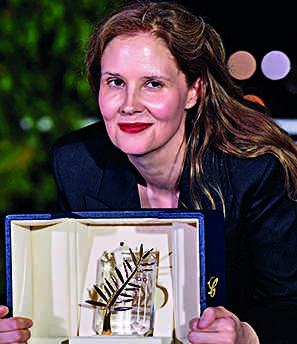Justine Triet‘s “Anatomy of a Fall” won the Palme d’Or at the 76th Cannes Film Festival in a ceremony on Saturday that bestowed the festival’s prestigious top prize on an engrossing, rigorously plotted French courtroom drama that puts a marriage on trial.
“Anatomy of a Fall,” which stars Sandra Huller as a writer trying to prove her innocence in her husband’s death, is only the third film directed by a woman to win the Palme d’Or. One of the two previous winners, Julia Ducournau, was on this year’s jury. Cannes’ Grand Prix, its second prize, went to Jonathan Glazer’s “The Zone of Interest,” a chilling Martin Amis adaptation about a German family living next door to Auschwitz.
The awards were decided by a jury presided over by two-time Palme winner Ruben Ostlund, the Swedish director who won the prize last year for “Triangle of Sadness”. The ceremony preceded the festival’s closing night film, the Pixar animation “Elemental”.
Remarkably, the award for “Anatomy of a Fall” gives the indie distributor Neon its fourth straight Palme winners. Neon, which acquired the film after its premiere in Cannes, also backed “Triangle of Sadness,” Ducournau’s “Titane” and Bong Joon Ho’s “Parasite,” which it steered to a best picture win at the Oscars.
Triet was presented the Palme by Jane Fonda, who recalled coming to Cannes in 1963 when, she said, there were no female filmmakers competing “and it never even occurred to us that there was something wrong with that”. This year, a record seven out of the 21 films in competition at Cannes were directed by women. After a rousing standing ovation, Triet, the 44-year-old filmmaker, spoke about the protests that have roiled France this year over reforms to pension plans.
“This award is dedicated to all the young women directors and all the young male directors and all those who cannot manage to shoot films today,” she added. “We must give them the space I occupied 15 years ago in a less hostile world where it was still possible to make mistakes and start again.”
After the ceremony, Triet reflected on being the third female director to win the Palme, following Ducournau and Jane Campion (“The Piano”). “Things are truly changing,” she said. Best actor went to veteran Japanese star Koji Yakusho, who plays a reflective, middle-aged man who cleans toilets in “Perfect Days”.
The Turkish actor Merve Dizdar took best actress for the Nuri Bilge Ceylan’s “About Dry Grasses.” Ceylan’s tale is about a teacher, Samet (Deniz Celiloglu), accused of misconduct by a female student. Dizdar plays a friend both attracted and repelled by Samet. “I’d like to dedicate this prize to all the women who are fighting to exist and overcome difficulties in this world and to retrain hope,” said Dizdar. Vietnamese-French director Tran Anh Hung took best director for “Pot-au-Feu,” a foodie love story starring Juliette Binoche and Benoit Magimel.
“Anatomy of a Fall,” which stars Sandra Huller as a writer trying to prove her innocence in her husband’s death, is only the third film directed by a woman to win the Palme d’Or. One of the two previous winners, Julia Ducournau, was on this year’s jury. Cannes’ Grand Prix, its second prize, went to Jonathan Glazer’s “The Zone of Interest,” a chilling Martin Amis adaptation about a German family living next door to Auschwitz.
The awards were decided by a jury presided over by two-time Palme winner Ruben Ostlund, the Swedish director who won the prize last year for “Triangle of Sadness”. The ceremony preceded the festival’s closing night film, the Pixar animation “Elemental”.
Remarkably, the award for “Anatomy of a Fall” gives the indie distributor Neon its fourth straight Palme winners. Neon, which acquired the film after its premiere in Cannes, also backed “Triangle of Sadness,” Ducournau’s “Titane” and Bong Joon Ho’s “Parasite,” which it steered to a best picture win at the Oscars.
Triet was presented the Palme by Jane Fonda, who recalled coming to Cannes in 1963 when, she said, there were no female filmmakers competing “and it never even occurred to us that there was something wrong with that”. This year, a record seven out of the 21 films in competition at Cannes were directed by women. After a rousing standing ovation, Triet, the 44-year-old filmmaker, spoke about the protests that have roiled France this year over reforms to pension plans.
“This award is dedicated to all the young women directors and all the young male directors and all those who cannot manage to shoot films today,” she added. “We must give them the space I occupied 15 years ago in a less hostile world where it was still possible to make mistakes and start again.”
After the ceremony, Triet reflected on being the third female director to win the Palme, following Ducournau and Jane Campion (“The Piano”). “Things are truly changing,” she said. Best actor went to veteran Japanese star Koji Yakusho, who plays a reflective, middle-aged man who cleans toilets in “Perfect Days”.
The Turkish actor Merve Dizdar took best actress for the Nuri Bilge Ceylan’s “About Dry Grasses.” Ceylan’s tale is about a teacher, Samet (Deniz Celiloglu), accused of misconduct by a female student. Dizdar plays a friend both attracted and repelled by Samet. “I’d like to dedicate this prize to all the women who are fighting to exist and overcome difficulties in this world and to retrain hope,” said Dizdar. Vietnamese-French director Tran Anh Hung took best director for “Pot-au-Feu,” a foodie love story starring Juliette Binoche and Benoit Magimel.
